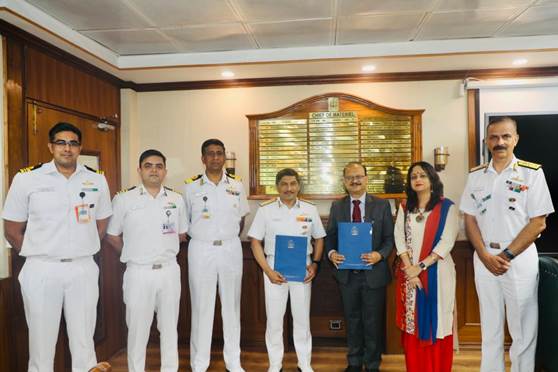Quantum technologies will soon be used to develop secure maritime communications in a joint effort by the Raman Research Institute (RRI) and the Indian Navy.
AMN / WEB DESK
Raman Research Institute (RRI), an autonomous institute of the Department of Science and Technology (DST), inked a Memorandum of Understanding (MoU) with the Weapons and Electronics Systems Engineering Establishment (WESEE), the R&D establishment of the Indian Navy, during a ceremony held in New Delhi recently. The MoU, which is for a period of five years, was signed between Professor Tarun Souradeep, Director, RRI, and Vice Admiral Sandeep Naithani, Chief of Materiel, Indian Navy.
Under this agreement, RRI’s Quantum Information and Computing (QuIC) lab will lead the research efforts towards developing quantum key distribution techniques that the Indian Navy could leverage in the nation’s efforts towards securing free space communications.

The MoU was signed in New Delhi/ Credit: Indian Navy
“I am absolutely delighted that Indian Science and Technology ecosystem has been opening borders in recent years that enable talented and world-class researchers in the academic research institutions to contribute to the growth of Science and Technology capabilities in strategic areas of national importance. Porosity of the perceived boundary between fundamental and applied sciences as well as Science and Technology, will bode well in the coming decades. RRI feels proud to partner with WESEE in cutting edge Science and Technology,” said Prof. Souradeep.
Professor Urbasi Sinha, Group Head, QuIC lab, said, “This is a great opportunity to use indigenously developed science and technology knowledge to serve our nation. We are excited with the collaboration and believe that with our expertise in the domain of secure quantum communications, we will be able to help foster cutting-edge research towards identification of potential maritime use-cases for the Indian Navy.”
This lab has been leading the country’s research in the field of secure quantum communication. Some of its major achievements include the development of an end-to-end simulation toolkit named “qkdSim”, ensuring safety in communication platforms, establishing secure communication between two buildings, and, more recently, between a stationary source and a mobile receiver. QuIC lab also happens to be India’s first laboratory to propose and implement a wide range of applications using single and entangled photons, particularly towards establishing secure communications in strategic areas like banking, defence, and cyber security.
For more details, Professor Urbasi Sinha may be contacted at usinha@rri.res.in

